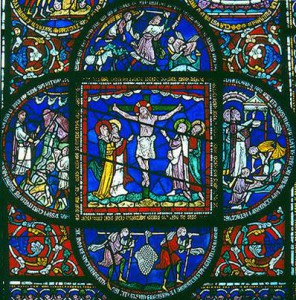“For the word of the cross, to them indeed that perish, is foolishness; but to them that are saved, that is, to us, it is the power of God.” I Corinthians 1:18
Based on St Paul’s text, Geoffrey Babion, a twelfth-century theologian, explained how God chose a seemingly foolish way to redeem sinful human beings. Only the faithful could see something so outwardly shameful as a man dying in a horrific manner on a cross as the power of God. Geoffrey, then, gave a lengthy explanation of humanity’s fall and Christ’s redemption:
“When he was similar to God, the man had honor. He did not understand, when he sinned. Therefore, he was made similar to a beast of burden, when by sinning he became irrational. Two creatures had sinned, namely, the devil and the man. But one [sinned] by himself, and the other [sinned] through another. Therefore, since the devil [sinned] by himself, he did not deserve to be restored, particularly since he consists of such a subtle and spiritual essence. The man, since he was made from dirt, since he was deceived by such a cunning tempter, did not lose the hope of forgiveness. Therefore, although God and man were such opposites, neither the hope of forgiveness or redemption by such a just judge should be denied. Divine providence looked for the most equitable manner of reconciliation. For reason demanded that whoever wants to join two contrary things together, places such a thing between them that has a connection with both things.” Geoffrey Babion [Falsely attributed to Hildebert], In festo exaltationis sanctae crucis, PL 171: 683C-D [My translation] 
Geoffrey demonstrates a great familiarity with the teachings regarding the fall of humanity and redemption in the twelfth-century schools here. His explanation in this sermon reflects Anselm of Canterbury’s basic doctrine of reconciliation of sinful human beings with a just God in his famous dialogue, Why God Became Man. Notice how Geoffrey continued in the next section:
“Moreover, when such from one part was God, the ignoble man was so much from the other part, so that they had to be reconciled, and through such a mediator, who was God and a human being. Therefore, with righteous judgment, God, who wanted to reconcile the human race, became a human being. If He had wanted to redeem angels, He would have taken on the angelic nature, but since He determined that only human beings were worthy for redemption, He took on human nature, a subservient person in a reasonable manner.” Ibid., 683C-684A.
